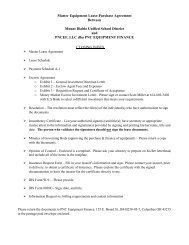Study of the Mount Diablo Unified School District - Mt. Diablo Unified ...
Study of the Mount Diablo Unified School District - Mt. Diablo Unified ...
Study of the Mount Diablo Unified School District - Mt. Diablo Unified ...
- No tags were found...
You also want an ePaper? Increase the reach of your titles
YUMPU automatically turns print PDFs into web optimized ePapers that Google loves.
Service Delivery Options and Continuum <strong>of</strong> Servicesdepartment administration indicated during onsite visits that all salaries and expenses for<strong>the</strong>se services are covered by monthly billings generated by <strong>the</strong> school psychologist toMedi‐Cal, and SB90, a claiming mechanism for students who qualify for services underAB3632. In order to access <strong>the</strong>se services, students must be evaluated and diagnosed witha mental health disorder as defined by <strong>the</strong> DSM‐IV. The school psychologist positionsassigned to <strong>the</strong> collaborative provide <strong>the</strong> mental health assessments, and <strong>the</strong> Contra CostaMental Health Services reviews and verifies <strong>the</strong> mental health diagnosis for eligiblestudents, thus qualifying <strong>the</strong> student for mental health counseling provided by <strong>the</strong>collaborative.According to <strong>the</strong> department, this collaboration by <strong>the</strong> district and Contra Costa HealthServices is considered a model program. In November 2007, <strong>the</strong> Contra Costa County Board<strong>of</strong> Supervisors recognized this program for its exemplary services to students.The district funding match required by <strong>the</strong> Contra Costa Mental Health Services is $930,952.Based on documentation provided by <strong>the</strong> Contract Costa Health Services, this local matchsupports five separate contracts, two directly with MDUSD, Sunrise/Alliance and Fair OaksMedi‐Cal clinic, and three community‐based contracts with Families First, Fred Finch, andSeneca. The contracts total $7,469,462, most <strong>of</strong> which is drawn from Medi‐Cal and SB90claiming.With 352 students enrolled in <strong>the</strong> program, <strong>the</strong> average cost per student is $2,644. Basedon data provided by <strong>the</strong> Department, each nonpublic school placement for students withmental health needs costs <strong>the</strong> district $35,000 to $40,000 or more, depending upon <strong>the</strong>additional related services and mental health services <strong>of</strong>fered. The data fur<strong>the</strong>r estimates a$19,000 to $24,000 cost savings per student by maintaining students in <strong>the</strong> Mental HealthCollaborative ra<strong>the</strong>r than providing education in a nonpublic school. According to districtadministration, if <strong>the</strong> mental health collaborative contracts are maximized, <strong>the</strong> MDUSD’sshare <strong>of</strong> <strong>the</strong> cost would be 12.5 cents for every dollar <strong>of</strong> service. Fur<strong>the</strong>r, it is reported bydistrict administration that <strong>the</strong> cost/benefit to MDUSD could be significant, especially given<strong>the</strong> pr<strong>of</strong>essional level <strong>of</strong> programming.During school visits and classroom observations, MGT consultants found very high adult‐tostudentratios, typically ranging from one adult to two or three students at all grade levels.MGT recognizes that best‐practice models have a high adult‐to‐student ratio for studentswith severe emotional or behavioral challenges; however, in some cases, MGT consultantsobserved situations where <strong>the</strong>re were more adults than students in classrooms and instudent isolation areas. During classroom observations <strong>of</strong> numerous programs across <strong>the</strong>district, MGT consultants did not observe any consistent and active engagement <strong>of</strong> studentswith mental health personnel or instructional staff. MGT consultants did not observe anycounseling sessions or mental health interventions by <strong>the</strong> school psychologists assigned to<strong>the</strong> collaborative. MGT consultants observed disengagement <strong>of</strong> students and/or whole‐classinstruction in 87 percent <strong>of</strong> classrooms observed.MGT <strong>of</strong> America, Inc. Page 3‐24















